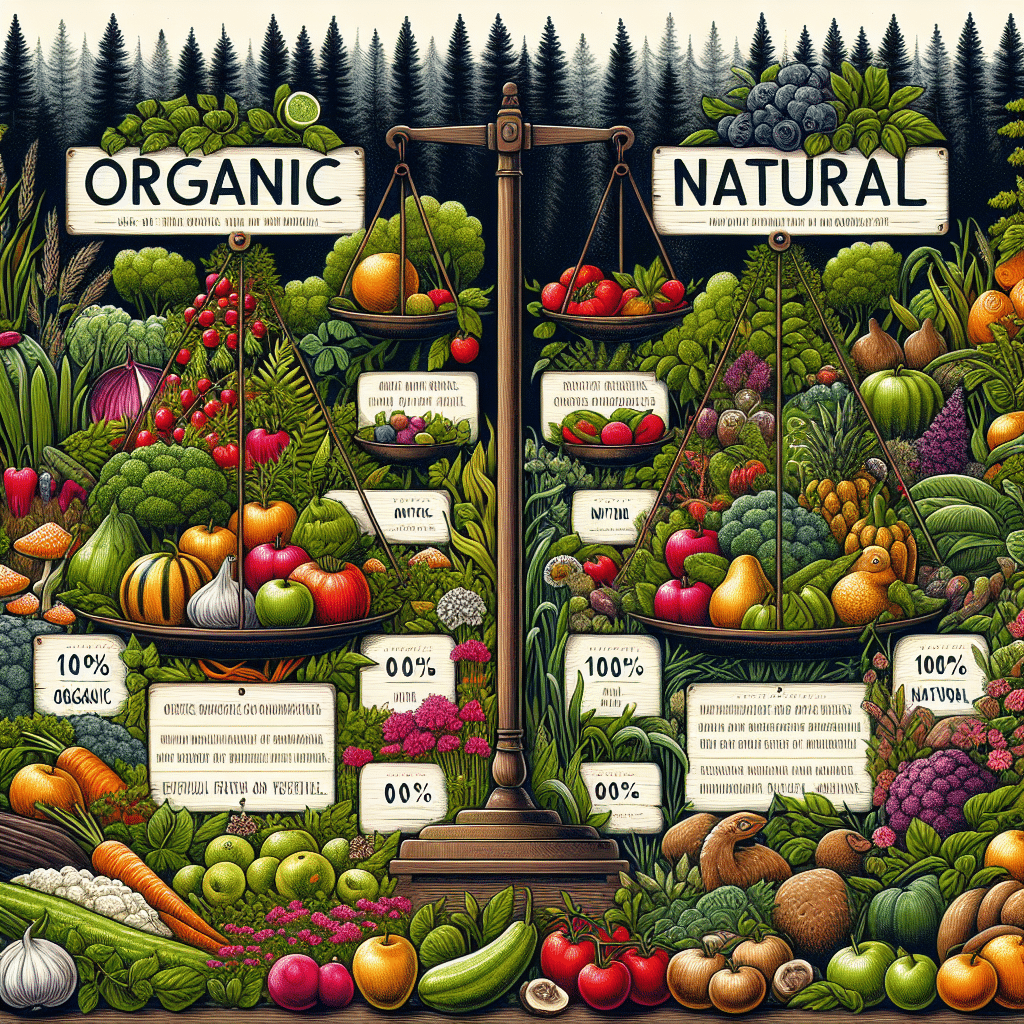Organic vs. Natural: Understanding Flavors & Labels
-
Table of Contents
- Organic vs. Natural Flavors: Deciphering Food Labels for Healthier Choices
- What Does “Organic” Really Mean?
- The Truth Behind “Natural” Labels
- Organic vs. Natural Flavors: The Health Perspective
- Environmental Impact of Organic and Natural Flavors
- Case Studies and Statistics: Organic and Natural Flavors in the Market
- How to Make Informed Choices
- Conclusion: The Importance of Understanding Labels
- Discover ETprotein’s Organic Protein Products
Organic vs. Natural Flavors: Deciphering Food Labels for Healthier Choices

When it comes to food shopping, the plethora of labels and terms can be overwhelming. Two terms that often cause confusion are “organic” and “natural,” especially when they’re used to describe flavors and ingredients in our food. Understanding the difference between these labels is crucial for making informed decisions about what we eat and how it impacts our health and the environment.
What Does “Organic” Really Mean?
Organic food and flavors refer to the way agricultural products are grown and processed. To be certified organic, a product must meet specific standards set by a country’s organic certification body, such as the USDA in the United States. These standards typically include:
- No use of synthetic fertilizers, pesticides, or genetically modified organisms (GMOs).
- Conservation of soil and water to enhance environmental quality.
- Use of renewable resources and the conservation of soil and water.
- Animal welfare considerations, such as providing outdoor access for livestock.
Organic flavors are derived from ingredients that meet these organic standards. They are processed without synthetic chemicals and do not contain artificial flavors or preservatives.
The Truth Behind “Natural” Labels
On the other hand, “natural” is a term that is not as strictly regulated. It generally implies that the product does not contain artificial ingredients or preservatives and is minimally processed. However, the lack of a clear definition means that practices such as the use of pesticides and non-organic farming methods can still be used in the production of “natural” products.
When it comes to flavors, “natural” means that the flavoring is derived from a natural source, such as a spice, fruit, or vegetable. However, it does not guarantee that the source was grown organically.
Organic vs. Natural Flavors: The Health Perspective
From a health standpoint, organic flavors are often considered superior due to the absence of harmful pesticides and chemicals. Studies have shown that organic foods may have higher levels of certain nutrients, including antioxidants. Additionally, consuming organic foods reduces your exposure to antibiotic-resistant bacteria and hormone disruptors.
Natural flavors, while free from artificial additives, do not offer the same assurances regarding pesticide use and farming practices. Therefore, they may not provide the same health benefits as their organic counterparts.
Environmental Impact of Organic and Natural Flavors
The production of organic flavors tends to have a more positive environmental impact. Organic farming practices are designed to reduce pollution, conserve water, reduce soil erosion, and use less energy. Farming without pesticides is also better for nearby birds and animals, as well as people who live close to farms.
Natural flavors do not have the same stringent requirements, and therefore, their environmental impact can vary greatly. Without regulations, some natural flavors could come from sources that do not prioritize environmental health.
Case Studies and Statistics: Organic and Natural Flavors in the Market
Consumer demand for organic products has been steadily increasing. According to the Organic Trade Association, sales of organic food in the United States reached $50.1 billion in 2019, up 4.6% from the previous year. This trend reflects a growing awareness of the benefits of organic products.
However, the market for natural flavors is also significant. A report by Grand View Research estimated that the global natural flavors market size was valued at USD 13.56 billion in 2019 and is expected to grow. This growth is attributed to consumer preference for natural products over artificial ones.
How to Make Informed Choices
When shopping for flavors and food products, here are some tips to help you make informed choices:
- Look for the USDA Organic seal or other trusted organic certification labels.
- Read ingredient lists to identify artificial additives and preservatives.
- Research brands and their farming practices to ensure they align with your values.
- Consider the environmental and health impacts of the products you choose.
Conclusion: The Importance of Understanding Labels
Understanding the difference between organic and natural flavors is essential for making choices that align with your health goals and environmental values. While both options are better than artificial alternatives, organic flavors offer more assurances in terms of health benefits and environmental impact. By becoming more label-savvy, consumers can drive demand for more sustainable and healthier food options.
Discover ETprotein’s Organic Protein Products
If you’re looking for high-quality organic protein options, ETprotein offers a range of products that cater to various dietary needs. Their selection includes organic rice protein, pea protein, and other plant-based proteins that are non-GMO and allergen-free. With a commitment to purity and quality, ETprotein’s offerings are an excellent choice for those seeking organic protein sources.
About ETprotein:
ETprotein, a reputable protein and L-(+)-Ergothioneine (EGT) Chinese factory manufacturer and supplier, is renowned for producing, stocking, exporting, and delivering the highest quality organic bulk vegan proteins and L-(+)-Ergothioneine. They include Organic rice protein, clear rice protein, pea protein, clear pea protein, watermelon seed protein, pumpkin seed protein, sunflower seed protein, mung bean protein, peanut protein, and L-(+)-Ergothioneine EGT Pharmaceutical grade, L-(+)-Ergothioneine EGT food grade, L-(+)-Ergothioneine EGT cosmetic grade, L-(+)-Ergothioneine EGT reference grade and L-(+)-Ergothioneine EGT standard. Their offerings, characterized by a neutral taste, non-GMO, allergen-free attributes, with L-(+)-Ergothioneine purity over 98%, 99%, cater to a diverse range of industries. They serve nutraceutical, pharmaceutical, cosmeceutical, veterinary, as well as food and beverage finished product distributors, traders, and manufacturers across Europe, USA, Canada, Australia, Thailand, Japan, Korea, Brazil, and Chile, among others.
ETprotein specialization includes exporting and delivering tailor-made protein powder and finished nutritional supplements. Their extensive product range covers sectors like Food and Beverage, Sports Nutrition, Weight Management, Dietary Supplements, Health and Wellness Products, and Infant Formula, ensuring comprehensive solutions to meet all your protein needs.
As a trusted company by leading global food and beverage brands and Fortune 500 companies, ETprotein reinforces China’s reputation in the global arena. For more information or to sample their products, please contact them and email sales(at)ETprotein.com today.














